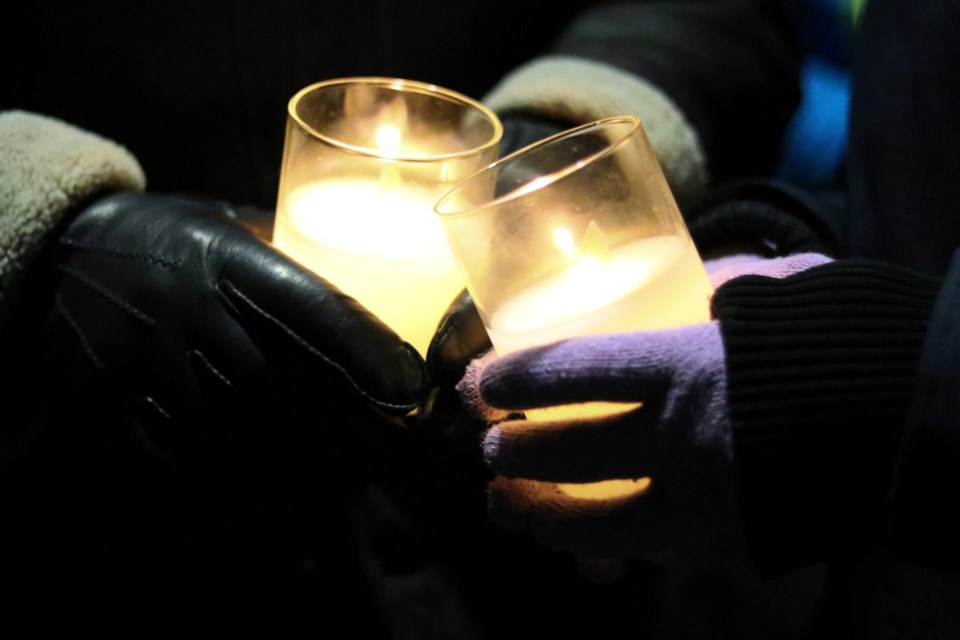Around than 100 community members from different faiths braved the first real snow of the year Tuesday evening to mourn the lives lost in the Israel-Hamas conflict during a vigil outside city hall.
The multi-faith vigil was organized by the newly formed Guelph chapter of Independent Jewish Voices, an organization that describes itself as representing Canadian Jews who have a strong commitment to social justice and universal human rights.
Members of the Jewish and the Muslim communities spoke, leading participants through prayers and mourning rituals, including Imam Mubeen from the Water Street Masjid, Rob Reid from the Unity Mosque and Jewish spiritual leader, Kohenet Jenna Rose.
“We are here today as Jews, as Palestinians and as allies to mourn the deaths of all those killed in Israel Palestine over the last 52 days since Oct. 7,” said Jillian Oliver, one of the organizers and a member of IJV Guelph. "We are heartbroken by the steep loss of life and destruction of homes."
“We are also here to call for a lasting ceasefire, for the release of all Israeli hostages, and the release of all Palestinian prisoners being held without trial and for an end to the occupation and for systemic structural change in Israel Palestine,” she said during the vigil.
Oliver said she hopes people will keep taking action even as the weather gets colder here in Guelph.
“Violence begets more violence,” she said. “The events of the last several weeks emphasize that, without a doubt, there is no such thing as safety for some and not for others. Safety cannot come at the expense of human lives and livelihoods. Safety cannot exist for one group of people while others face daily violence.”
Oliver said there is no military solution to the conflict, and that the only call is for a ceasefire, to build a “just and lasting peace.”
She said one of the first lessons in the Torah is that all humans are created in God’s image, which implies that every single person has infinite worth and is equal, and is calling on the Jewish community to live by those principles, “and to question what lessons we should learn from millennia of repeated persecutions and exiles.”
“Do we want to let this trauma and the very real threat of anti-semitism be weaponized to further genocidal aims? Or do we … advocate for the lives of all individuals?”
“Our grief is a prayer, not a war cry,” she said.
Oliver encouraged everyone to turn to the person next to them and share what they’re grieving and what they’re hoping for, with many citing ceasefire, liberation and justice.
Imam Mubeen led the group through an Islamic prayer for the deceased, some of which was silent, because in Islamic tradition “we mourn quietly,” he said. “It’s more sentimental that way.”
“Muslims and Christians and Jews have co-existed for hundreds of years in such close proximity, with so much love and affection for one another,” her said, though he said the conflict is not a religious but a political one.
“I don’t remember in my life, ever seeing the type of injustices that are happening today,” he said. “So we stand together to highlight and remember those innocent people that have lost their lives.”
Reid from the Unity Mosque also spoke of the importance of coming together in this way, and across faiths, before leading the group in prayer of peace.
“It’s something we need to do to survive,” Reid said. “We need to lay this type of groundwork so that when difficult things happen, we come together and say, this is the time we make a change for the better rather than allowing it to allow things to get worse for some of that work is happening here.”
Rose closed the vigil by leading everyone in some Jewish grief rituals, like lighting memorial candles “to remember those lives that have been taken in the past few months,” the mourner’s Kaddish (a blessing for the dead) and the act of Kriah (the Hebrew word for tearing).
“(Kriah) is the ancient tradition of tearing your fabric or your clothing upon learning about the death of a loved one,” she said. “Just as the fabric will be forever changed by the tear we make, our hearts are forever changed by the loss of a loved one.”
She said it is a radical act to tear Kriah to reflect collective grief for all lives lost due to violence, and “demonstrates the profound impact of these deaths.”
“It is a reminder of our humanity, humanity we see in each other, and knowing that until all of us are free, no one is free.”
Afterward, fabric was tied to a string of paper doves, which will be given to a business at a later date to display, and to use for future events.
